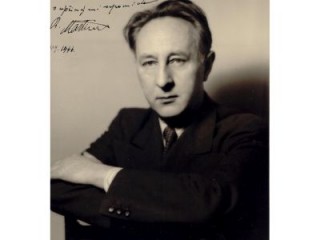
Bohuslav Martinu biography
Date of birth : 1890-12-08
Date of death : 1959-08-28
Birthplace : Polička, Bohemia
Nationality : Czech
Category : Famous Figures
Last modified : 2011-01-22
Credited as : Composer, Fresques de Piero della Francesca for orchestra, Mirandolina
The Czech composer Bohuslav Martinu was the most important composer of his generation in the former Czechoslovakia.
Bohuslav Martinu was the son of a small-town shoemaker who was also the custodian of a church tower used as a fire-lookout station. Bohuslav was born in the tower and spent his childhood there. The composer suggested that this physical detachment from the usual childhood experiences helped to form his introspective and reflective nature. Violin lessons from a village teacher revealed his strong musical aptitude, and when he was 16 he went to Prague to attend the conservatory. He did not respond well to the rigid training and was soon expelled.
In spite of his failure at the conservatory, Martinu became a violinist in the Czech Philharmonic Orchestra, a post he held from 1913 to 1923, except for the war years (1914-1918), when he returned to his native village. His early works include the Czech Rhapsody (1920) and the ballet Istar (1922). Realizing that he needed more formal training in composition, he returned to the conservatory to study with Josef Suk.
With the aid of a government grant Martinu went to Paris in 1923, where he lived for the next 17 years. He became a pupil of Albert Roussel, whose economical but vigorous scores he admired. Martinu lived in the simplest manner, making his living by teaching a few private pupils and from the commissions he received from time to time. Important compositions of this era are Half-time (1925), inspired by a soccer game, and La Bagarre (1926; Tumult), dedicated to Charles Lindbergh, who had just made his flight to Paris. Serge Koussevitsky, the conductor of the Boston Symphony Orchestra, introduced Martinu's music to the United States. In 1932 his String Sextet won the Coolidge Prize for chamber music.
During the Paris years Martinu did not lose contact with Czechoslovakia. He wrote a folk ballet called Spalicek (1931), a kind of variety show of sketches from Czech life; The Miracle of Our Lady (1933), a medievalstyle miracle play; and the opera Juliette (1938). The major work of this period is his Double Concerto (1938), a powerful work expressing his feelings just before World War II and the imminent downfall of his country.
With the outbreak of war Martinu went to the United States, where he remained until 1953. He taught at the Berkshire Summer School and at Princeton University. Works of the American period include a Symphony (1942), a Violin Concerto (1943) and a Concerto for Two Pianos and Orchestra (1943). An accidental fall in 1946 resulted in a period of amnesia and partial deafness.
Martinu lived in Rome from 1953 to 1955, where he wrote Fresques de Piero della Francesca for orchestra, the opera Mirandolina and his Sixth Symphony. He completed his twelfth and last opera, based on Nikos Kazantzakis's Greek Passion Play, shortly before his death in Switzerland.
Martinu's music was in no sense reactionary, but at the same time it was never blatantly "modern" or "experimental." It is characterized by the freedom of its melodies, perhaps influenced by Czech inflections, the vigor of its rhythms, and the transparency of its textures. He favored concerto grosso-like structures, contrapuntal and continuous, over sonata forms, and he avoided sentimentality and dramatic effects.
MilošŠafránek, Bohuslav Martinu: The Man and His Music (1944; rev. ed. 1946), was written by a friend of the composer and contains a thorough discussion of Martinu's personality and style. More recent studies of Martinu are in Arthur Cohn, Twentieth-century Music in Western Europe: The Compositions and the Recordings (1965), and David Ewen, The World of Twentieth-century Music (1968).
Martinu, Charlotta, My life with Bohuslav Martinu, Prague: Orbis Press Agency, 1978.
















